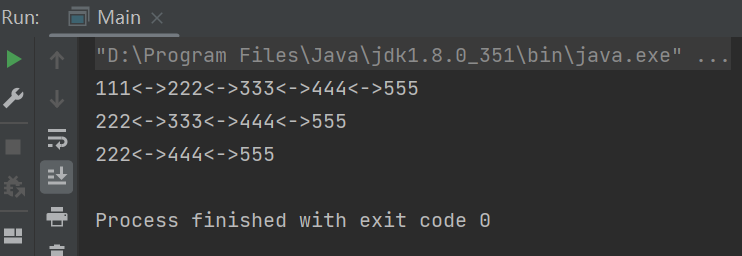Java双向链表实现队列
2022-11-21 15:46 杭伟 阅读(159) 评论(0) 收藏 举报将双向链表做简单的改造,即可实现一个FIFO(First Input First Out)队列,
该队列只在头节点出队,尾节点入队。
一般来说定义节点类只需一个后驱节点next即可。
这里保留pre节点,模拟一个已经入队的节点,如果需要取消,这样pre节点就是一个优势。
定义节点类:
/** * 队列元素 */ public class Node { private int data;//数据域 private Node pre;//指向上一个节点 private Node next;//指向下一个节点 public int getData() { return data; } public void setData(int data) { this.data = data; } public Node getPre() { return pre; } public void setPre(Node pre) { this.pre = pre; } public Node getNext() { return next; } public void setNext(Node next) { this.next = next; } //构造函数 public Node(int data, Node pre, Node next){ this.data = data; this.pre = pre; this.next = next; } public Node(int data){ this(data,null,null); } public Node(){ this(0,null,null); } }
队列实现:

1 /** 2 * Java双向链表实现队列(FIFO) 3 * Author:hangwei 4 * 2022/11 5 */ 6 public class DQueue { 7 private Node head; 8 private Node tail; 9 private int size; 10 public Node getHead() { 11 return head; 12 } 13 public Node getTail() { 14 return tail; 15 } 16 public DQueue(){ 17 tail = head = null; 18 size = 0; 19 } 20 21 //尾部入队 22 public void add(Node target){ 23 if(target == null) 24 return; 25 if (size == 0) { 26 target.setPre(target); 27 target.setNext(target); 28 tail = head = target; 29 } else{ 30 tail.setNext(target);//尾节点的下一个节点是新节点 31 target.setPre(tail);//新节点的上一个节点是尾节点 32 //标记新的尾节点 33 tail = target; 34 } 35 size++; 36 } 37 38 //头节点出队or取消某个已入队节点 39 public void romove(Node target){ 40 if(size == 0){ 41 System.out.println("null linked list ,can not delete."); 42 return; 43 } 44 else if(size == 1){ 45 head = tail = null; 46 } 47 else if(target == null || target.equals(head)) {//target为空或头节点,则头出队 48 head = head.getNext(); 49 head.setPre(null); 50 } 51 else {//移除队列中指定的元素 52 target.getPre().setNext(target.getNext()); 53 target.getNext().setPre(target.getPre()); 54 if(target.equals(tail))//如果出队是尾节点 55 tail=target.getPre();//标记新的尾节点 56 } 57 size--; 58 } 59 60 //打印队列 61 public void print(){ 62 Node node = new Node(); 63 node = head; 64 while (node.getNext() != head && node.getNext() != null){//遍历 65 System.out.print(node.getData()); 66 System.out.print("<->"); 67 node = node.getNext(); 68 } 69 System.out.print(node.getData());//补充打印循环体的最后一个节点 70 System.out.println(); 71 } 72 }
测试:
public class Main { public static void main(String[] args) { DQueue dq = new DQueue(); dq.add(new Node(111)); dq.add(new Node(222)); dq.add(new Node(333)); dq.add(new Node(444)); dq.add(new Node(555)); dq.print(); dq.romove(null); dq.print(); dq.romove(dq.getHead().getNext()); dq.print(); } }
执行结果:

*重点:使用双指针链表实现队列,可以很方便的移除队列中某个不需要的元素。
作者:hangwei
出处:http://www.cnblogs.com/hangwei/
关于作者:专注于开源平台,分布式系统的架构设计与开发、数据库性能调优等工作。如有问题或建议,请多多赐教!
版权声明:本文版权归作者和博客园共有,欢迎转载,但未经作者同意必须保留此段声明,且在文章页面明显位置给出原文链接。
如果您觉得文章对您有帮助,可以点击文章右下角“推荐”一下。您的鼓励是作者坚持原创和持续写作的最大动力!


 浙公网安备 33010602011771号
浙公网安备 33010602011771号